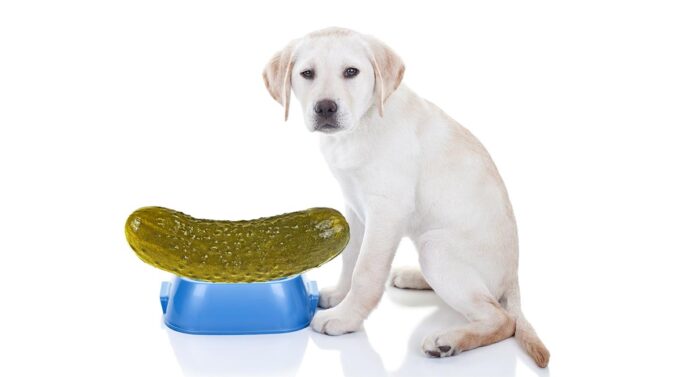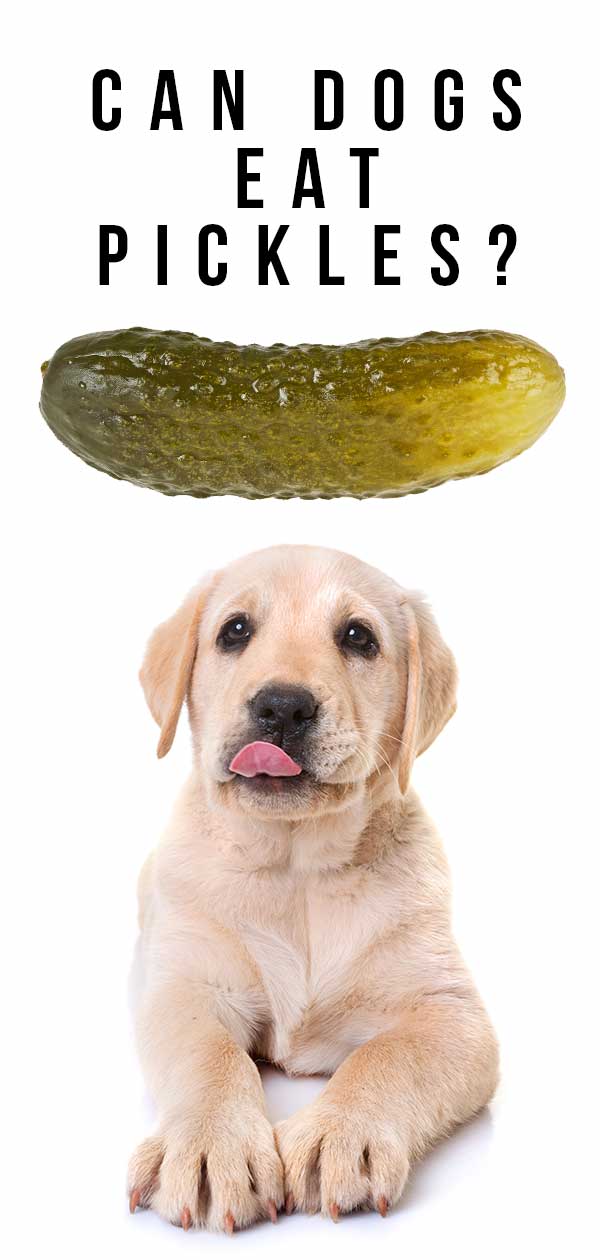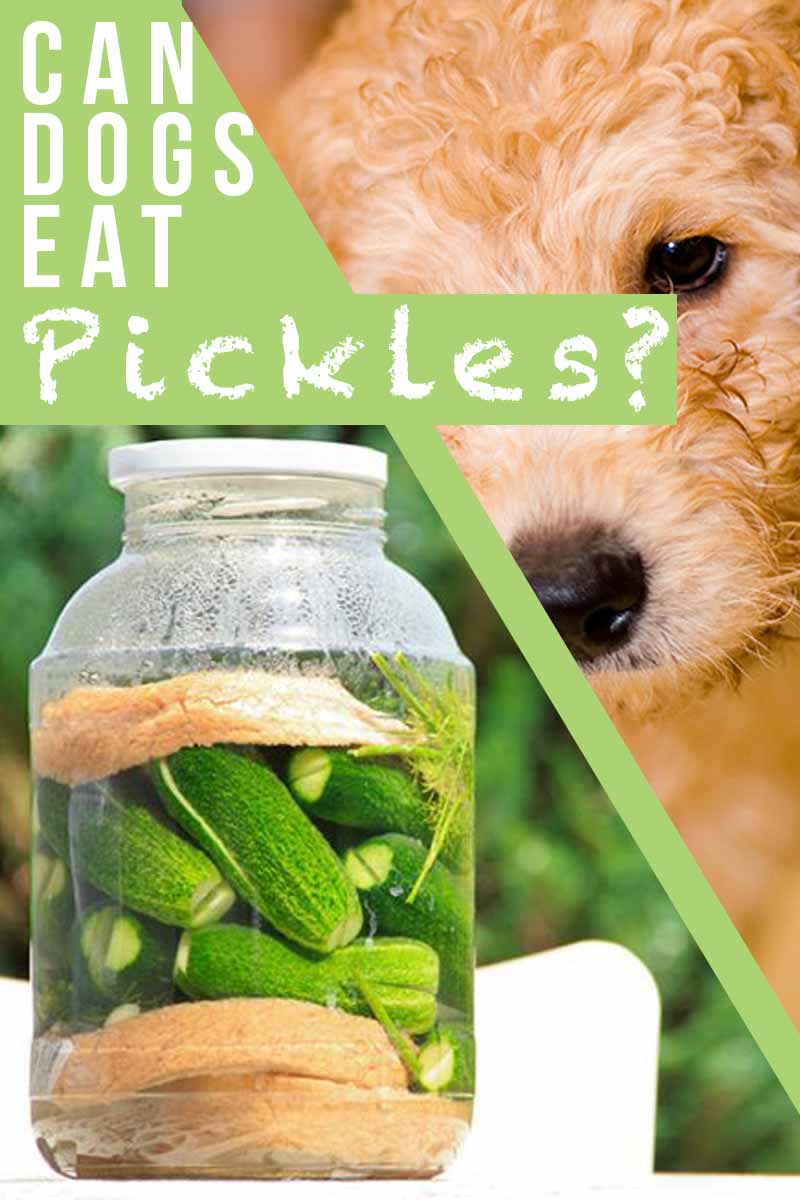Can dogs eat pickles? Like many human foods, dogs can have pickles in small amounts. They include some nutrients such as magnesium, which your dog will benefit from. However, if the pickles are prepared with onions and lots of garlic, it’s best to skip sharing it with your dog. So the answer to, “Can dogs have pickles?” is yes, but there are some caveats.
Can Dogs Eat Pickles?
Many humans agree that nothing is more satisfying then chomping into a crisp and delicious pickle. And when you are eating that pickle, your dog will surely beg for a bite, just like he does everything else! While you may be tempted to give in to the begging and the eyes staring intently at your meal, there are some human foods that your dog just should not eat.
We generally think of pickles as cucumbers that have been brined, or “pickled.” However, you can pickle a lot more than just cucumbers! Everything from carrots, peppers, and other vegetables to other types of food, such as meats and even fruits. For this article, however, we will focus on the traditional pickle: a pickled cucumber. Pickles are often considered to be a fairly healthy snack for humans. There may even be some health benefits, such as assisting with weight loss and prevention of diabetes.
In and of themselves, pickles are not necessarily bad for dogs. But the important factor here is how the pickle is actually made. Can dogs have pickles of just any sort?
Dogs And Pickles
There are many different ways to pickle a cucumber. Some pickles are fermented. Others are sweet. Still others are combined with other pickled vegetables, such as onions. And there are often high amounts of sodium in pickles. These factors definitely need attention before you give pickles to your dog. We’ll go into them in a little more detail further on.
The pickling itself, without the additives, should not be harmful to your dog. Many dogs, however, don’t particularly enjoy the taste or smell of vinegar or brine. These dogs won’t want to eat a pickle even if you give it to them!
As with most human foods that can be shared with dogs, it should be given only in moderation. And it’s always best to try your dog out with just a little bit, to make sure that the food doesn’t hurt their stomach or cause some other problem such as an allergic reaction.
When Are Pickles Bad For Dogs?
Many pickle recipes, especially the homemade bread and butter pickle varieties, are made with onions. White and yellow onions may be used, and both of these types can cause anemia issues.
Onions are harmful because they contribute to the formation of something called Heinz bodies. While this may sound like something you can find in a bottle of ketchup, Heinz bodies are far from appetizing. Specifically, they are clumps of hemoglobin that develop when your dog eats onions. These red blood cell clumps cannot carry oxygen like they should. The red blood cells die much quicker than usual too, and this causes hemolytic anemia.
Onion induced hemolytic anemia has long been studied. The good news is that it is rarely fatal unless you feed your dog onions on a regular basis over the course of many years. However, anemia can cause some fatigue issues, poor appetite, and exercise intolerance. It can be easily prevented, in part, by providing your dog with a healthy diet.
If anemia is a concern, then you should understand that Heinz bodies can develop if your dog eats any food from the allium family. This family of vegetables includes foods filled with oxidizing organosulfur compounds, like shallots, leeks, chives, scallions, and garlic. Garlic is often a main ingredient used in making pickles. It is far less likely to cause anemia issues than some of the other allium family vegetables, but garlic consumption should still be controlled. In other words, moderation is key when it comes to garlic and your dog.
Are Pickles Good For Dogs?
Other concerns about dogs and pickles may include the cucumbers themselves, as well as the spices that are used to make the pickle. If you are looking for the good news, then you are in luck. There are a few things to celebrate when it comes to pickles.
Since pickles are made from cucumbers, your puppy pal will benefit from the vitamins in the vegetable. Cucumbers are filled with nutrients like vitamin A, magnesium, vitamin K, manganese, vitamin C, and phosphorous.
While dogs do require a wide variety of vitamins and nutrients, just like humans, the magnesium in the cucumbers can be quite helpful to your pup. Studies show that magnesium deficient diets can cause weaknesses in your dog’s heart and this can contribute to future heart attack risks.
Not only are the cucumbers healthy, but so are some of the spices used to make pickles. The good news is that dill, cinnamon, clove, and other pickling spices are safe for dogs (and quite yummy too). Dill, especially, can assist in reducing gas and digestive discomfort issues.
Sometimes nutmeg is used to make pickles though, and this spice is quite toxic to dogs due to something called myristicin. Basically, if you want to give your dog pickles and ensure a safe treat, then look very closely at the ingredients. Make sure that onions, onion powder, and nutmeg are not included on the list. Remember, a small bit of garlic is OK, but you may want to avoid dill pickles that contain a lot of it, unless your veterinarian tells you that garlic is fine for your pup.
Can Dogs Have Pickle Juice?
Can dogs have pickles in juice form? If you have heard all the buzz surrounding apple cider vinegar and its health benefits, then you probably think that pickle juice, with its high vinegar content, is healthy for your dog. However, there is no research that supports this claim.
Also, while apple cider vinegar is typically touted as healthy, white vinegar is rarely lauded by health enthusiasts. This is the type of vinegar used to make pickles. In fact, some pet experts say that vinegar really is not even good for dogs as a topical spray. Vinegar is often used as a flea repellent, but outdated research studies are typically used to support this claim. The vinegar can actually disrupt the pH balance of the skin and it can make the coat look dull. So, it is not even a good choice as a topical agent, let alone one that your dog ingests.
Speaking of pH imbalances, the acidic nature of the vinegar can cause some stomach upset and diarrhea. The acid can place stress on the kidneys as well. If you dog is older, then the kidneys may not be able to handle and process nearly as much acid as they once did.
Due to the vinegar in the pickles themselves, you may wonder if you should be feeding your dog pickles at all. If you have concerns about this, like if your dog has kidney disease for example, then make sure to speak with your veterinarian before giving your dog any type of pickle, even if you are feeding just a slice or two.
Can Dogs Eat Sweet Pickles?
By now, you know that pickles are made from cucumbers, and this vegetable is quite healthy on its own. In fact, cucumbers are a low calorie, low fat snack that is fit for a dog. However, the cucumbers are mostly made of water and have little taste. To make sweet pickles taste sweet and delicious, they require a good deal of sugar. The sugar content does fluctuate between brands, and one serving of bread and butter pickles may contain as little as 7 grams of sugar or as much as 28 to 30 grams.
So, can dogs eat pickles that are sweetened? Sugar is bad for dogs and can lead to diabetes, weight gain, and even cavities. Basically, your canine companion can be affected by sugar much like you can. So, check out the packages closely and find a product that contains the least amount of sugar.
Keep in mind that sugar-free products are not typically a good option for dogs since they often contain xylitol. Xylitol is an artificial sweetener that is toxic to dogs, so try to avoid these products.
Can Dogs Eat Dill Pickles?
You definitely do not need to worry about added sugar when it comes to those tart and savory dill pickles. And, if you choose a non-garlic variety, then you may have a safe and tasty snack for your pup.
There is just one thing you need to watch out for, and that is all the salt in the pickles. Unfortunately, one medium sized dill pickle can contain somewhere between 700 and 1,500 milligrams of sodium. In comparison, a teaspoon of salt has about 2,300 milligrams of sodium, and one teaspoon is the suggested upper limit when it comes to daily human sodium consumption.
You may notice that your dog’s commercial food has some sodium in it. Like our food, it is added for taste, but dogs should not be given too much salt. It only makes sense that dogs should eat far less sodium than humans. If you look at the daily requirements for dogs, you will see that 100 milligrams is suggested. This means that a single slice of a dill pickle may be more than enough to satisfy your dog’s daily sodium requirements.
Of course, there are some good low sodium dill pickle options on the market that taste just as yummy as the traditional high sodium kinds, so look for these. Just be careful with your purchases. Although the pickles may be low in sodium, they can still contain over 100 milligrams per spear.
Can Pickles Treat Bad Breath In Dogs?
Can dogs have pickles and actually see health benefits? Some of the potential benefits of pickles, as we mentioned before, include the spices that are used to make pickles. Leaving out the addition of nutmeg and garlic salt, let’s focus on one spice in particular: dill.
As well as assisting with such possible issues as flatulence and other stomach problems, dill has the potential to be a great help with the common doggy issue of bad breath. Doggy breath is best managed by regular brushing of the teeth, it’s true. But what a dog eats — or doesn’t eat — can also help to control their chronic halitosis. And dill is one of those spice additions that actually helps to freshen breath.
This doesn’t mean that you should give your dog all the pickles they want in the hopes that their bad breath will go away! But it does mean that there’s a possible side benefit to your dog’s occasional pickle treat.
Should I Give My Dog Pickles?
As we mentioned above, your dog may not be at all inclined to eat pickles. And if that is the case, it’s best to leave well enough alone. However, if your dog does seem to want to share everything on your plate, including the pickle, then double check the ingredients first.
After that, assuming that the pickle meets the criteria we’ve discussed above, give your dog just a small taste. Before giving him any more, observe him for a little while to make sure that there is no stomach upset or other bad reaction.
How To Prepare Pickles For Dogs
If the pickles in your refrigerator don’t include too much sugar, salt, or garlic, and if they haven’t been prepared with onions, then it’s probably safe to proceed and give your dog a piece of one as a treat. But can dogs have pickles that are whole?
It’s recommended that you avoid giving the dog an entire dill pickle. These can often be quite large, especially some varieties. That’s likely to be far too much sodium. You may also worry about whether your dog can physically eat pickles without causing himself any harm. Some dogs seem to swallow their treats whole in their eagerness to munch on a tasty snack. If your dog is the type to swallow treats whole, then you might want to give him a few pickle slices instead of a spear. Remember, however, that spears may be choking hazard even if they are cut in half. So keep this in mind if you want to ensure a safe treat for your begging pup.
Alternatives To Pickles For Dogs
Almost every dog wants to share food with her human. This means that whatever you’re eating, your pup wants a piece of it, too! If you’re not inclined to give dogs and pickles a try, here are a few other healthy snack options that you can easily share with your begging best friend.
- Apples
- Carrots
- Pineapple
But, make sure you avoid any toxic foods such as chocolate.
Can Dogs Eat Pickles Summary
As you have learned, pickles may or may not be safe. So don’t just throw that spear in your dog’s direction until you have thoroughly looked over the ingredients and know that it will not cause your canine companion any harm. You should also make sure that pickles are only an occasional treat.
Additionally, it’s always advisable to contact your veterinarian to see if a pickle here or there can be added to your dog’s treat regimen. This is an especially good idea since pickles are not exactly a health food for people or pets. Of course, there is always the chance that your dog will simply not like pickles due to their tart flavoring.
Do you have a pickle loving dog? Let us know in the comments below.
Readers Also Liked
- Can Dogs Eat Cucumber?
References and Further Reading
-
- Stevens, C. 2018. Are Pickles Good For You? Healthline
- Xylitol And Your Dog: Danger, Paws Off! Food And Drug Administration Consumer Update, 2018
- Your Dog’s Nutritional Needs. National Academies Press
- Johnson, C, et al. 2009. Frozen pickle juice reduces mealtime glycemia in healthy adults. FASEB Journal.
- Bandoim, L. 2018. The Science Behind Everyone’s Obsession With Pickle Juice. Forbes.
- Beber, S. 2014. The Benefits of Dill for your Dog. Animal Wellness Magazine.
- JW Harvey, D Rackear. Experimental Onion-Induced Hemolytic Anemia in Dogs. Vet. Pathol. 22: 387-392 (1985)
- Salgado BSI; Monteiro LNII; Rocha NSI, II. Allium species poisoning in dogs and cats. J. Venom. Anim. Toxins incl. Trop. Dis vol.17 no.1 Botucatu 2011
- Chang, C, et al. Magnesium deficiency and myocardial infarct size in the dog. J Am Coll Cardiol. 1985 Feb;5(2 Pt 1):280-9
- Eldredge, D. M., et al. Dog Owner’s Home Veterinary Handbook. (John Wiley And Sons, 2010).
- Nutmeg and Cinnamon Toxicity. Pet Poison Helpline.
This article has been extensively revised and updated for 2019.
The Labrador Site Founder
Pippa Mattinson is the best selling author of The Happy Puppy Handbook, the Labrador Handbook, Choosing The Perfect Puppy, and Total Recall.
She is also the founder of the Gundog Trust and the Dogsnet Online Training Program
Pippa's online training courses were launched in 2019 and you can find the latest course dates on the Dogsnet website






















I gave my dog a small piece of the pickle that I was eating and she got really bad diarrhea she’s usually very playful but all she wants to do now is sleep she won’t eat her food and I’m getting worried no more pickles for my sugar that’s her name
My greedy ass dog, love and eat everything. Thank God – I only give her a treat: here and there… she get doggie treats “here and there”, but human food – nawww, not often… here and there, regardless of her puppy eyes… 😂. I’m hoping she understands, I love her. I want her to have a long life – I’m not the one to pay, spend – to much money – on doggie surgery. Nope, not happening so – I feed her now – healthy, well and responsible. To hell with all
I just offered her a piece of pickle. Her look was why would I want that?